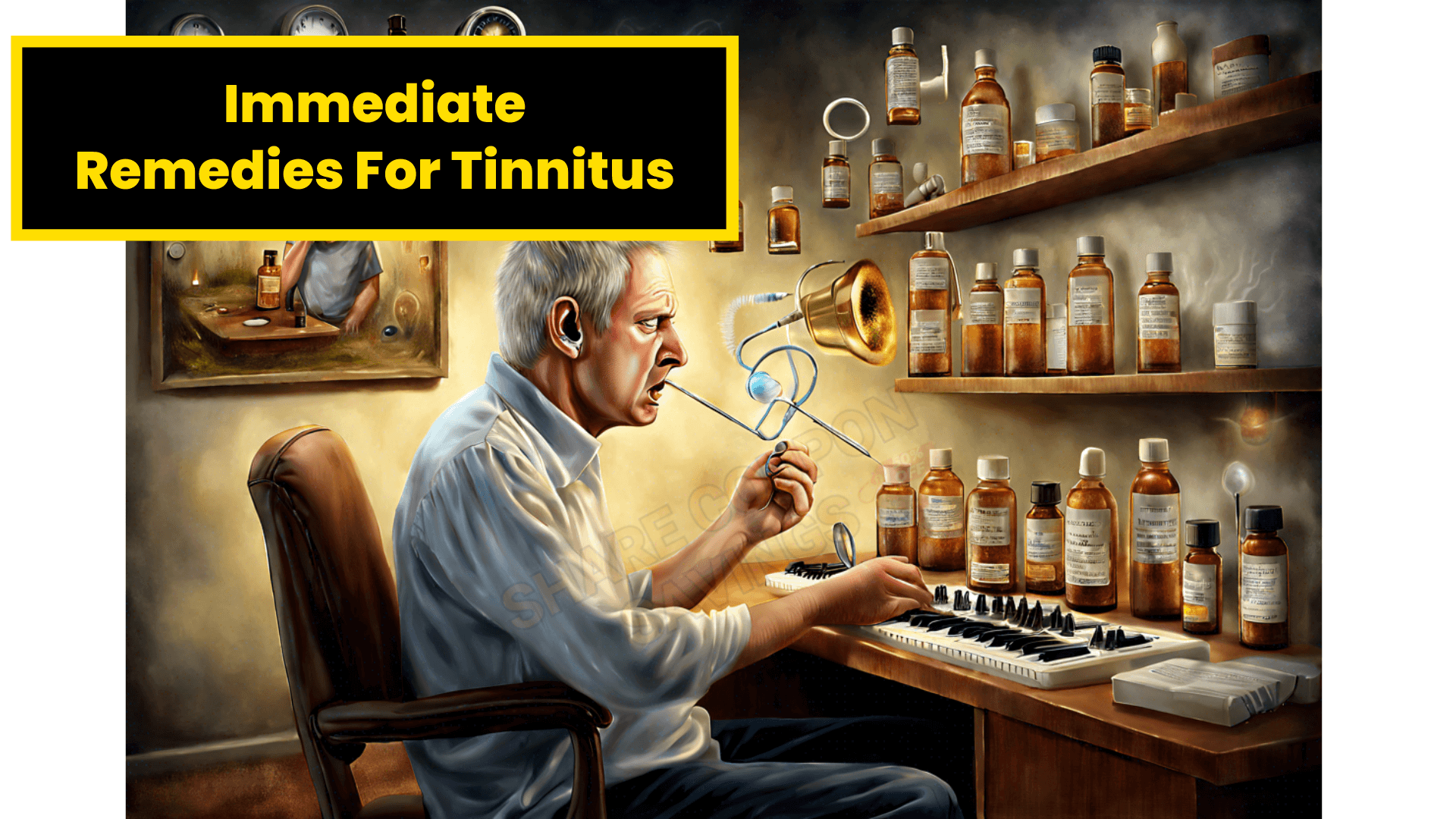Immediate Relief! Stop Tinnitus Ringing. Don’t suffer with constant ringing. Discover effective remedies to quiet tinnitus & regain peace. Learn more here!
Living with constant ringing in your ears is a nightmare! Tinnitus disrupts sleep, concentration, and everyday life. But you don’t have to suffer! This article explores powerful remedies for immediate tinnitus relief. Find solutions to quiet the ringing and reclaim your peace of mind.
Keep reading to discover these effective methods or click here to explore the full tinnitus relief guide!
Immediate Remedies for Tinnitus
Tinnitus, a condition characterized by a persistent ringing or buzzing sound in the ears, can be a frustrating and disruptive experience for those who suffer from it. Fortunately, there are immediate remedies that can provide relief and help manage the symptoms. In this article, we’ll explore some of the most effective and accessible options to help you find the right solution for your tinnitus.
Relaxation Techniques for Tinnitus Relief
One of the most effective immediate remedies for tinnitus is the use of relaxation techniques. When the body is in a state of stress or anxiety, the symptoms of tinnitus can worsen. By practicing relaxation exercises, you can help your body and mind enter a more calming state, which can lead to a reduction in the perceived volume of the tinnitus sound. Some popular relaxation techniques include deep breathing exercises, meditation, and progressive muscle relaxation.
Sound Masking Therapy
Another immediate remedy for tinnitus is sound masking therapy. This approach involves using external sounds to “mask” or cover up the internal tinnitus sound. By introducing a soothing, ambient noise, such as white noise, nature sounds, or gentle music, the brain is able to focus on the external sound rather than the tinnitus. This can provide temporary relief and help you manage the condition more effectively.
Dietary Changes and Supplements
Your diet can also play a role in the management of tinnitus. Certain foods and beverages, such as those high in salt, caffeine, or alcohol, can exacerbate tinnitus symptoms. By making adjustments to your diet and incorporating more tinnitus-friendly foods, you may be able to experience some immediate relief. Additionally, some dietary supplements, such as ginkgo biloba or melatonin, have been found to have a positive effect on tinnitus symptoms.
Hearing Aid Devices
For individuals with underlying hearing loss, the use of hearing aid devices can be an effective immediate remedy for tinnitus. These devices can help amplify external sounds, making it easier for the brain to focus on the desired audio and reducing the perceived volume of the tinnitus. Hearing aids can also provide a form of sound masking, as the amplified external sounds can help to “cover up” the tinnitus.
Related Articles
You may also find the following articles helpful.
Ear Wax Removal
In some cases, the presence of excessive ear wax can contribute to the severity of tinnitus. By having a healthcare professional safely remove the ear wax, you may experience immediate relief from your tinnitus symptoms. This can be especially helpful for individuals who have a buildup of wax in the ear canal.
Stress Management Techniques
Stress and anxiety can exacerbate tinnitus symptoms, so it’s important to find effective ways to manage your stress levels. Engaging in stress-reducing activities, such as yoga, meditation, or deep breathing exercises, can help alleviate the intensity of tinnitus and provide immediate relief.
Remember, the effectiveness of these immediate remedies may vary from person to person, and it’s important to consult with a healthcare professional to determine the best course of action for your specific situation. By exploring these various options, you can take proactive steps to manage your tinnitus and find the relief you deserve.
Identifying the Underlying Causes of Tinnitus
Understanding the Triggers of Tinnitus
Tinnitus, the persistent ringing, buzzing, or whistling sound in the ears, can be a frustrating and debilitating condition for those affected. While the experience of tinnitus can be distressing, identifying the underlying causes is crucial for finding effective remedies. By understanding the potential triggers and factors contributing to tinnitus, individuals can take proactive steps to manage their symptoms and improve their quality of life.
Hearing Loss and Noise Exposure
One of the primary causes of tinnitus is hearing loss, often resulting from prolonged exposure to loud noises. Exposure to high-decibel sounds, such as those encountered in industrial settings, loud music, or even from certain medical procedures, can damage the delicate structures within the inner ear. This damage can lead to changes in the way the brain processes and perceives sound, ultimately resulting in the perception of tinnitus.
Ototrauma and Injury
Tinnitus can also be triggered by physical trauma to the ear, known as ototrauma. This can occur due to sudden, loud noises, as well as head or neck injuries. When the structures of the ear are damaged, it can disrupt the normal function of the auditory system, leading to the perception of tinnitus.
Cardiovascular Conditions
Certain cardiovascular conditions, such as high blood pressure, atherosclerosis, and anemia, have been linked to the development of tinnitus. These conditions can affect the blood flow and oxygen supply to the inner ear, potentially causing changes in the perception of sound and the onset of tinnitus.
Medications and Drugs
Some medications and drugs, both prescription and over-the-counter, have been associated with tinnitus as a side effect. These include certain antibiotics, anti-inflammatory drugs, and diuretics, among others. Individuals who are taking medications that may contribute to tinnitus should consult with their healthcare provider to explore alternative treatment options or make adjustments to their medication regimen.
Related Articles
You may also find the following articles helpful.
Stress and Anxiety
Emotional factors, such as stress and anxiety, can also play a role in the onset and exacerbation of tinnitus. Chronic stress can lead to increased muscle tension, which can in turn affect the functioning of the auditory system. Additionally, the psychological impact of tinnitus can create a cycle of stress and anxiety, further worsening the condition.
Metabolic Disorders
Certain metabolic disorders, including thyroid dysfunction, diabetes, and menopause, have been linked to tinnitus. These conditions can affect the body’s hormonal balance and metabolic processes, which can subsequently impact the auditory system and contribute to the perception of tinnitus.
Temporomandibular Joint (TMJ) Disorders
Disorders of the temporomandibular joint (TMJ), the joint connecting the jaw to the skull, can also lead to tinnitus. TMJ dysfunction can cause muscle tension and inflammation in the area, which can then affect the nearby structures of the ear and contribute to the experience of tinnitus.
By understanding these potential underlying causes of tinnitus, individuals can work closely with their healthcare providers to explore targeted treatment options, such as lifestyle modifications, hearing aids, or other therapies, to effectively manage their tinnitus and improve their overall quality of life.
Lifestyle Changes to Manage Tinnitus Symptoms
Adapting Your Lifestyle to Alleviate Tinnitus
Tinnitus, a persistent ringing, buzzing, or other sound in the ears, can significantly impact one’s quality of life. While there is no single cure, making lifestyle changes can help manage the symptoms and provide relief. By addressing various aspects of your daily routine, you can take proactive steps to mitigate the effects of tinnitus and improve your overall well-being.
Stress Management Techniques
Stress is a significant contributor to the exacerbation of tinnitus symptoms. Practicing relaxation techniques, such as deep breathing exercises, meditation, or yoga, can help reduce stress and provide a sense of calm. Additionally, engaging in activities that promote mental and emotional well-being, like spending time in nature, listening to soothing music, or practicing mindfulness, can be beneficial.
Dietary Adjustments
Certain dietary factors may influence tinnitus symptoms. Reducing the consumption of caffeinated beverages, such as coffee, tea, and energy drinks, can help alleviate the condition. Additionally, limiting the intake of alcohol and avoiding foods high in sodium, as they can contribute to fluid retention and potentially worsen tinnitus.
Sound Therapy Techniques
Sound therapy into your daily routine can help mask the persistent tinnitus sounds and provide a sense of relief. This can include using white noise machines, listening to calming nature sounds, or engaging in activities that generate ambient noise, such as running a fan or playing soothing music.
Related Articles
You may also find the following articles helpful.
Hearing Protection Measures
Exposure to loud noises can exacerbate tinnitus symptoms or even contribute to the development of the condition. It is essential to protect your hearing by wearing earplugs or noise-cancelling headphones in situations with high noise levels, such as concerts, construction sites, or when using power tools.
Physical Activity and Exercise
Engaging in regular physical activity can have a positive impact on tinnitus management. Exercise can help reduce stress, improve blood circulation, and promote overall well-being. Activities like walking, swimming, or light aerobic exercises can be particularly beneficial.
Sleep Hygiene Optimization
Tinnitus can interfere with sleep, leading to further distress and worsening of symptoms. Establishing a consistent sleep routine, limiting screen time before bed, and creating a relaxing sleep environment can help improve sleep quality and alleviate tinnitus-related insomnia.
Cognitive-Behavioral Therapy (CBT)
Cognitive-behavioral therapy has been shown to be an effective approach in managing tinnitus. By addressing negative thought patterns and behaviors associated with the condition, CBT can help individuals develop coping strategies and improve their ability to manage the psychological impact of tinnitus.
Remember, addressing tinnitus often requires a multifaceted approach, and the effectiveness of various lifestyle changes may vary from person to person. It is essential to work closely with your healthcare provider to develop a personalized plan that addresses your specific needs and preferences.
Exploring Medical Treatments for Tinnitus
Understanding Tinnitus and Exploring Treatment Options
Tinnitus, a condition characterized by a persistent ringing, buzzing, or other phantom sounds in the ears, can be a frustrating and debilitating experience for those who suffer from it. This complex condition can have a significant impact on a person’s quality of life, affecting their ability to concentrate, sleep, and engage in everyday activities. Fortunately, there are a variety of medical treatments available that can provide relief and improve the overall well-being of individuals living with tinnitus.
Identifying the Underlying Cause
One of the first steps in treating tinnitus is to identify the underlying cause. Tinnitus can be a symptom of a variety of underlying conditions, including hearing loss, ear infections, head or neck injuries, and even certain medications. By working closely with a healthcare provider, individuals can undergo a comprehensive evaluation to determine the root cause of their tinnitus, which is essential for developing an effective treatment plan.
Medication-Based Treatments
In some cases, medication-based treatments may be prescribed to manage the symptoms of tinnitus. These can include antidepressants, anti-anxiety medications, and certain types of antihistamines, which can help to reduce the perceived volume of the tinnitus sound or address any underlying conditions that may be contributing to the problem.
Related Articles
You may also find the following articles helpful.
Sound Therapy
Another common treatment approach for tinnitus is sound therapy, which involves the use of specialized devices or techniques to mask or divert attention away from the tinnitus sound. This can include the use of hearing aids, white noise generators, or even specialized tinnitus maskers that emit soothing sounds designed to counteract the perceived tinnitus sound.
Neuromodulation Techniques
Neuromodulation techniques, such as transcranial magnetic stimulation (TMS) and transcranial direct current stimulation (tDCS), are emerging as promising treatments for tinnitus. These non-invasive techniques involve the use of electrical or magnetic stimulation to target specific areas of the brain that are believed to be involved in the perception of tinnitus, potentially reducing the severity of the symptoms.
Dietary and Lifestyle Changes
In addition to medical treatments, dietary and lifestyle changes can also play a role in managing tinnitus. For example, reducing the consumption of caffeine, alcohol, and certain medications that can exacerbate tinnitus symptoms, as well as engaging in stress-reducing activities, such as meditation or yoga, may help to alleviate the condition.
Specialized Therapies
Some individuals with tinnitus may also benefit from specialized therapies, such as cognitive-behavioral therapy (CBT) or mindfulness-based techniques, which can help to address the psychological and emotional aspects of the condition. These approaches can help individuals develop coping strategies and reframe their perception of the tinnitus sound, ultimately improving their overall quality of life.
The exploration of medical treatments for tinnitus is an ongoing area of research and development, with a range of options available to help individuals manage this complex and often debilitating condition. By working closely with healthcare providers and exploring a variety of treatment approaches, individuals with tinnitus can take steps towards finding relief and improving their overall well-being.
Coping Strategies for Living with Chronic Tinnitus
Coping with the persistent ringing or buzzing sound of chronic tinnitus can be a challenging and frustrating experience. However, there are various strategies and techniques that can help individuals manage and find relief from this condition.
Establishing a Calming Routine
One of the most effective ways to cope with chronic tinnitus is to establish a consistent and calming routine. This can involve practices such as meditation, deep breathing exercises, or engaging in relaxing activities like yoga or gentle stretching. By incorporating these techniques into your daily life, you can help reduce the stress and anxiety that can often exacerbate the symptoms of tinnitus.
Masking the Tinnitus Sound
Another strategy for coping with chronic tinnitus is to use sound therapy or “masking” techniques. This involves introducing other sounds, such as soothing music, white noise, or nature sounds, to help distract the brain from focusing on the tinnitus. By providing a consistent background noise, these techniques can help minimize the perceived loudness of the tinnitus and make it less intrusive.
Dietary and Lifestyle Adjustments
Changes to your diet and lifestyle can also play a significant role in managing chronic tinnitus. Avoiding substances that can exacerbate the condition, such as caffeine, alcohol, or certain medications, may help alleviate symptoms. Additionally, maintaining a healthy sleep schedule, reducing stress, and engaging in regular exercise can all contribute to better overall wellness and potentially improve tinnitus-related discomfort.
Related Articles
You may also find the following articles helpful.
Seeking Professional Support
For some individuals, the management of chronic tinnitus may require the guidance and support of healthcare professionals. This can include consultations with audiologists, who can assess the underlying cause of the tinnitus and recommend appropriate treatment options, such as sound therapy or counseling. In some cases, medications or other medical interventions may also be considered as part of a comprehensive treatment plan.
Developing Coping Mechanisms
It’s essential to develop personal coping mechanisms that work best for you. This might involve keeping a journal to express your feelings, engaging in hobbies or activities that provide a sense of distraction or enjoyment, or connecting with support groups or online communities of individuals who understand the challenges of living with chronic tinnitus.
Remember, coping with chronic tinnitus is a highly individualized process, and what works for one person may not necessarily be effective for another. By exploring a combination of these strategies and techniques, you can work towards finding the most suitable approach to manage your tinnitus and improve your overall quality of life.
Key Takeaway:
Tinnitus, a persistent ringing, buzzing, or hissing sound in the ears, can be a frustrating and debilitating condition. However, there are immediate remedies, as well as long-term strategies, that can help manage this condition. By understanding the underlying causes, making lifestyle changes, and exploring medical treatments, individuals with tinnitus can find relief and better cope with the daily challenges it presents.
Identifying the Underlying Causes of Tinnitus
The first step in addressing tinnitus is to understand the underlying causes. Tinnitus can be triggered by a variety of factors, including exposure to loud noises, age-related hearing loss, ear injuries, and certain medications. By pinpointing the root cause, individuals can take targeted steps to address the problem and potentially find immediate relief.
Immediate Remedies for Tinnitus For those seeking quick relief, there are several immediate remedies that can be tried. These include using masking sounds, like white noise or relaxing nature sounds, to help distract from the tinnitus. Additionally, some people find relief through the use of tinnitus-specific apps or devices that generate soothing sounds. In some cases, simple lifestyle changes, such as reducing stress, avoiding loud environments, and getting enough sleep, can also provide immediate relief.
Lifestyle Changes to Manage Tinnitus Symptoms While immediate remedies can provide temporary relief, long-term management of tinnitus often requires a more comprehensive approach. Lifestyle changes, such as exercising regularly, practicing relaxation techniques, and maintaining a healthy diet, can help reduce the severity and impact of tinnitus symptoms. By addressing factors like stress, blood pressure, and overall well-being, individuals can better manage their tinnitus and improve their quality of life.
Exploring Medical Treatments for Tinnitus In cases where immediate remedies and lifestyle changes are not sufficient, medical treatments may be necessary. These can include medications, such as anti-anxiety drugs or antidepressants, that can help reduce the perception of tinnitus. In some instances, specialized therapies, like cognitive-behavioral therapy or sound therapy, may be recommended to help individuals cope with the psychological and emotional effects of tinnitus.
Coping Strategies for Living with Chronic Tinnitus
For those with persistent or chronic tinnitus, developing effective coping strategies is crucial. This may involve learning relaxation techniques, engaging in mindfulness practices, and seeking support from friends, family, or tinnitus support groups. By proactively addressing the emotional and psychological impact of tinnitus, individuals can better manage the condition and maintain a high quality of life.
Tinnitus is a complex condition that requires a multifaceted approach. By understanding the underlying causes, exploring immediate remedies, making lifestyle changes, and considering medical treatments, individuals with tinnitus can take control of their condition and find the relief and coping strategies they need to live a fulfilling life.
Conclusion
Tinnitus can be a frustrating and debilitating condition, but there are immediate remedies and long-term strategies that can provide relief. By identifying the underlying causes, making lifestyle changes, and exploring medical treatments, individuals with tinnitus can take proactive steps to manage their symptoms and improve their overall quality of life.
One of the key immediate remedies for tinnitus is sound therapy, which involves using external sounds to help mask the ringing or buzzing in the ears. This can be achieved through the use of white noise machines, fans, or even simply turning on the radio or TV. Additionally, certain relaxation techniques, such as deep breathing exercises or meditation, can help to reduce the perceived volume of the tinnitus and provide a sense of calm.
Identifying the underlying causes of tinnitus is also crucial in determining the most effective course of action. Factors such as age-related hearing loss, exposure to loud noises, or underlying medical conditions can all contribute to the development of tinnitus. By addressing the root cause, individuals can better target their treatment approach and potentially find more lasting relief.
Lifestyle changes can also play a significant role in managing tinnitus symptoms. Reducing stress and anxiety, avoiding excessive noise exposure, and maintaining a healthy sleep schedule can all help to alleviate the severity of tinnitus. Additionally, incorporating physical exercise and a balanced diet rich in antioxidants and anti-inflammatory nutrients can support overall auditory health and potentially reduce the impact of tinnitus.
For individuals whose tinnitus persists despite these initial interventions, medical treatments may be necessary. These can include prescription medications, such as antidepressants or anti-anxiety drugs, which can help to reduce the perception of tinnitus. In some cases, specialized therapies, such as tinnitus retraining therapy or cognitive-behavioral therapy, can also be effective in helping individuals cope with the condition.
For those living with chronic tinnitus, it is essential to develop coping strategies to manage the emotional and psychological impact of the condition. This may involve seeking support from healthcare professionals, joining tinnitus support groups, or engaging in hobbies and activities that provide a sense of distraction and relief. By adopting a holistic approach to tinnitus management, individuals can learn to live with the condition and maintain a good quality of life.
While tinnitus can be a challenging and persistent condition, there are numerous immediate remedies and long-term strategies available to help individuals manage their symptoms and improve their overall well-being. By addressing the underlying causes, making lifestyle adjustments, and exploring medical treatments, individuals with tinnitus can take control of their condition and find the relief they need to lead fulfilling and productive lives.
Related Articles
You may also find the following articles helpful.
Thank you for taking the time to read! I hope this detailed review of the “Tinnitus Relief Review: Silence Ringing Ears!” helps you make an informed decision about whether it’s the right choice for you.





